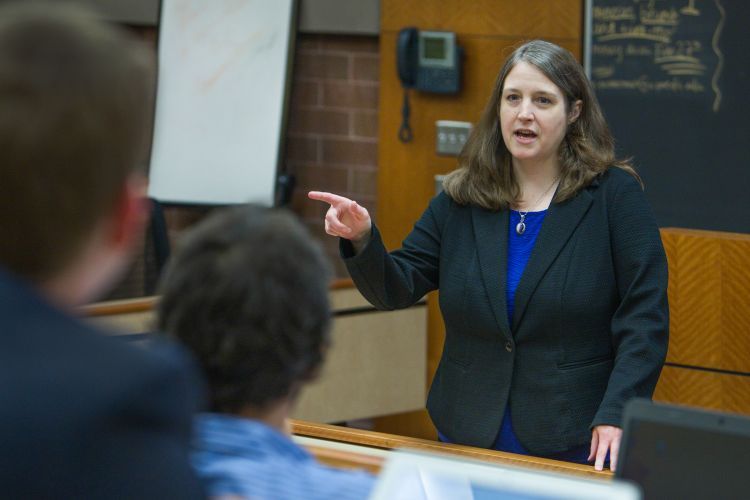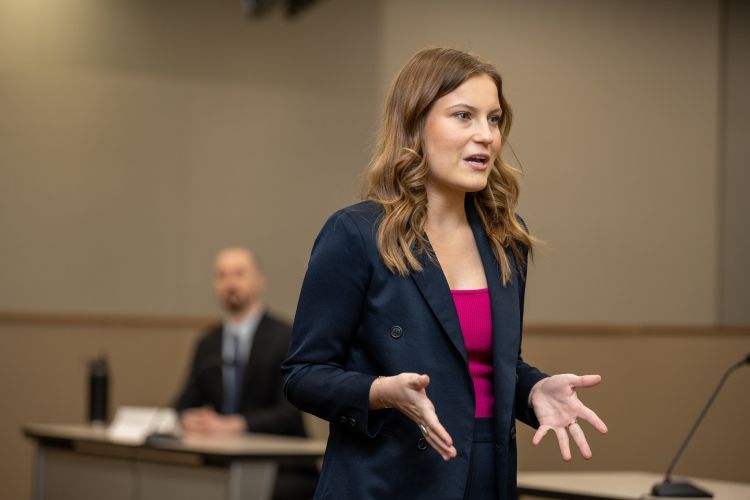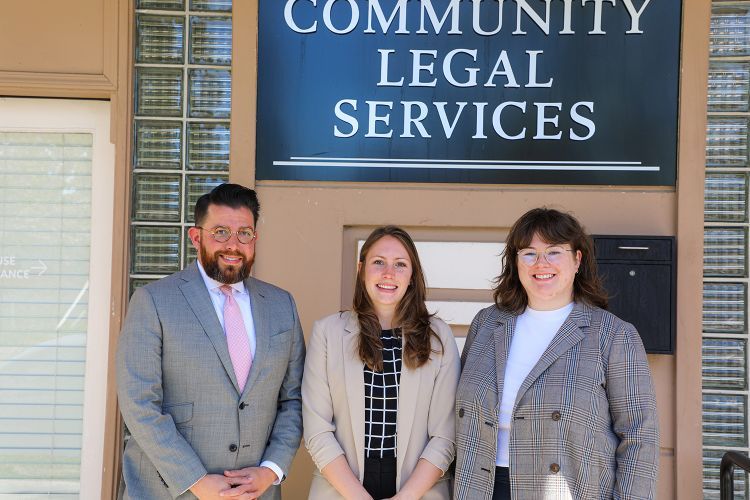Breadcrumb
Water law bill authored by McGeorge professor and other experts signed into law

Professor Jennifer Harder teaches courses in Water, Environmental, and Administrative Law at McGeorge. She also serves as co-director of McGeorge’s Water & Environmental Law Concentration and as the Faculty Director for Online Learning.
Climate change is deeply affecting the timing, location, and volume of California’s snowpack and rainfall. As a result, California’s water supplies are increasingly unreliable and unavailable for drinking water, agriculture, fish and wildlife, and other diverse needs. Even in a state used to scarcity, both Californians and the environment are feeling the impact.
To help address the climate and drought crises, McGeorge School of Law Professor Jennifer Harder spent a year and a half collaborating with a group of esteemed water experts on the development of recommendations for reforming California water. In addition to Professor Harder, the group included Clifford Lee, former deputy attorney general of the California Department of Justice; Richard Frank, professor of environmental practice at UC Davis School of Law; Tam Doduc, a former member of the State Water Resources Control Board; Barton (“Buzz”) Thompson, professor at Stanford Law School; Holly Doremus, professor at UC Berkeley School of Law; and Camille Pannu, associate clinical professor at Columbia Law School.
In early 2022, these water experts released a set of recommendations that were designed to improve California's adaptation to climate change. The water experts were inspired to draft the recommendations because of crises in California’s native fish populations and drinking water supplies, particularly in disadvantaged communities. According to the experts’ report on “Updating California Water Laws to Address Drought and Climate Change,” one million Californians do not have safe drinking water. Additionally, about 3,500 domestic wells became dry and about 2,600 households were negatively affected by the lack of available water during the last drought. These problems occured almost entirely within California's disadvantaged communities and low‑income households.
Throughout the year and a half leading up to the reform recommendations, the team of water experts engaged in a series of virtual discussions to define the issues and options for addressing them.
“We sat down extensively on Zoom calls talking over these issues and how they can be resolved and what needs to be changed to make a difference,” Harder said. “Decision-making was on a consensus basis, so every recommendation had to ultimately be supported by each member of the group.”
One of the recommendations was incorporated into a bill, Senate Bill 1205 (SB 1205), and Professor Harder testified in Senate Committee in support of the bill. The bill was signed by Gov. Gavin Newsom on Friday, Sept. 16, 2022.
Senate Bill 1205 requires California’s State Water Resources Control Board to adopt regulations that govern the Board's consideration of climate change effects in water availability analyses used in reviewing applications for water rights permits. As part of the rulemaking process, the board will consult the Department of Water Resources, the Department of Fish and Wildlife, and qualified hydrologists, among others.
“SB 1205 is a testament to the change-making inspiration of the late Jonas Minton, senior water policy advisor to the Planning & Conservation League,” Harder said. “He organized the recommendations process and facilitated SB 1205.”
Minton, a long-time member of California's water and environmental community, passed away in June. Harder noted that the team of water experts who drafted the reform recommendations was assembled by him, and the project was just one of his many contributions to California water.
“This particular bill was a priority for him. The signing of SB 1205 by Governor Newsom serves as a fitting testament to Jonas' memory,” Harder said.
Harder teaches courses in Water, Environmental, and Administrative Law at McGeorge. She also serves as co-director of McGeorge’s Water & Environmental Law Concentration and as the Faculty Director for Online Learning.
For more information about McGeorge School of Law’s degree offerings related to Water and Environmental Law, visit the websites below:
- JD Certificate of Concentration in Water & Environmental Law
- MSL Certificate of Concentration in Water & Environmental Law
- LLM Certificate of Concentration in Water & Environmental Law
- JSD in International Water Resources Law
For more information about McGeorge School of Law, visit our website.
Media Contacts:
- Ashley Golledge, Director of Marketing and Communications, agolledge@pacific.edu, 916.325.4687
- Victoria Ambriz, Marketing Coordinator, vambriz@pacific.edu, 916.325.4631
- Alex Banks, Communications Coordinator, abanks@pacific.edu, 916.520.7479





